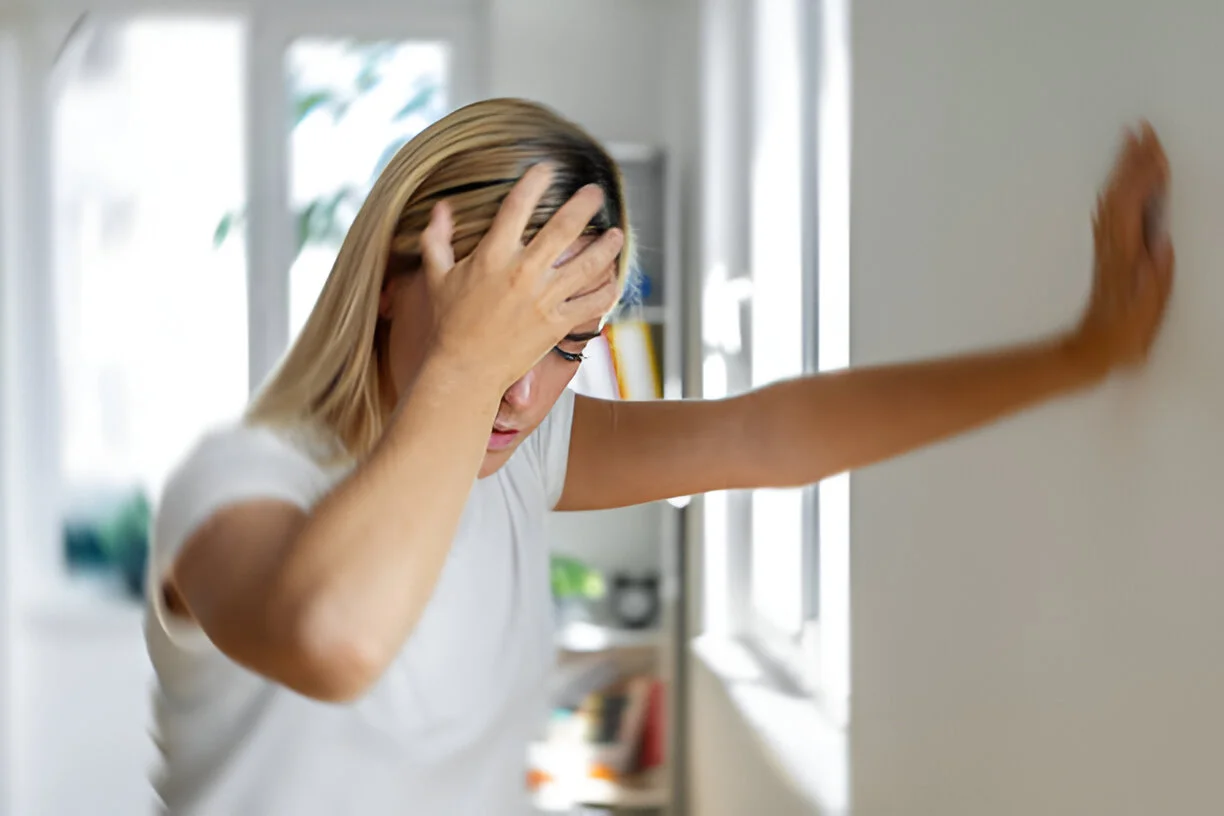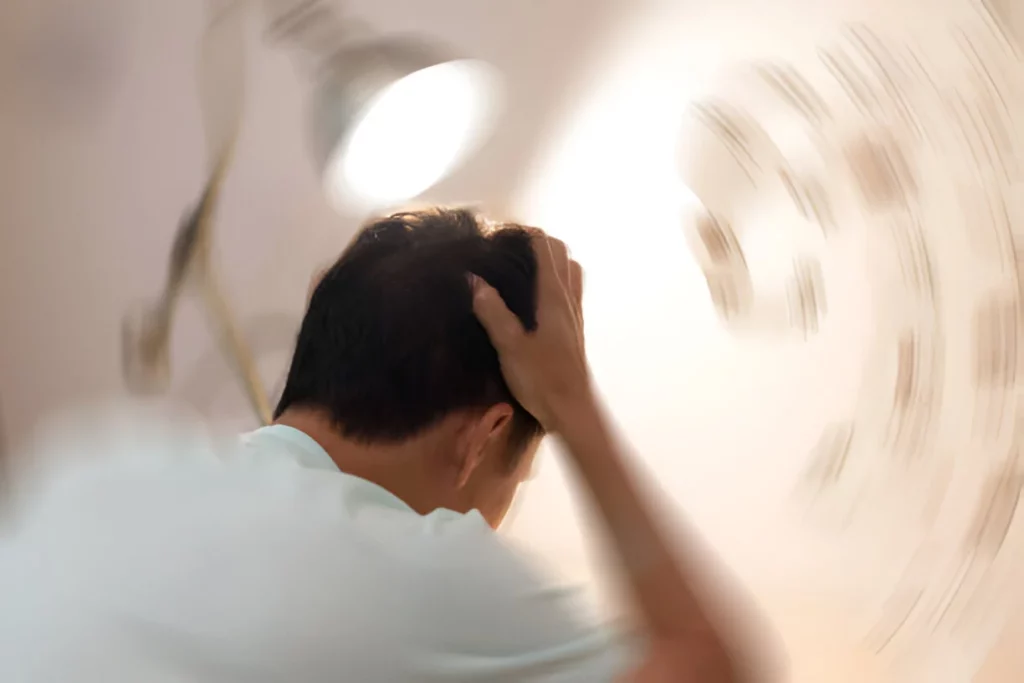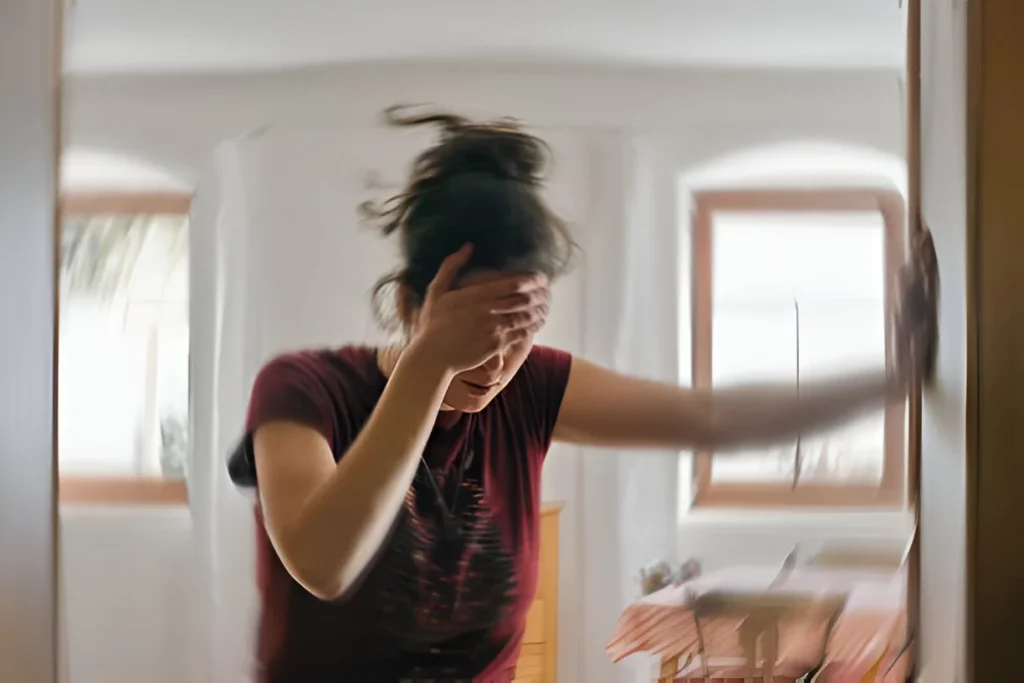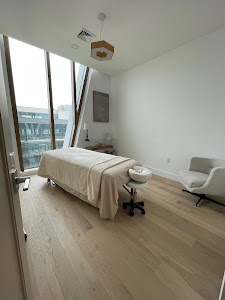Acupuncture for Vertigo
Acupuncture for Vertigo
What is Vertigo?

Vertigo is a sensation of spinning or dizziness, where a person feels as if they or their surroundings are moving when they are actually stationary. It is often described as a feeling of being off balance, which can cause difficulties with standing or walking. Vertigo is a symptom rather than a condition itself and can vary in intensity from mild to severe. This sensation can be disorienting and may occur suddenly or last for varying periods. Understanding and treating vertigo typically includes identifying and addressing its underlying cause.
What Causes Vertigo?
Vertigo is caused by various conditions that affect the inner ear or the brain. Common causes include:
- Benign Paroxysmal Positional Vertigo (BPPV). Small crystals in the inner ear become dislodged, causing brief episodes of dizziness when the head is moved in certain positions.
- Meniere’s Disease. A disorder of the inner ear characterized by episodes of vertigo, hearing loss, and tinnitus.
- Vestibular Neuritis. Inflammation of the vestibular nerve, typically caused by a viral infection, leading to severe vertigo.
- Labyrinthitis. Inflammation of the inner ear labyrinth, often due to infection, causing vertigo and hearing loss.
- Migraines. Some people experience vertigo as a symptom of migraines.
- Head Injury. Trauma to the head can affect the inner ear or brain regions involved in balance.
- Stroke. Disruption of blood flow to the brain can cause sudden and severe vertigo.
Understanding the underlying cause is important for proper diagnosis and treatment.
Symptoms of Vertigo
Symptoms of vertigo typically include:
- Dizziness. A spinning sensation, either of yourself or your surroundings.
- Balance Problems. Difficulty standing or walking steadily.
- Nausea and Vomiting. Feeling sick to your stomach or actually vomiting.
- Nystagmus. Abnormal, jerky eye movements that can accompany vertigo.
- Sweating. Excessive sweating during episodes of vertigo.
- Ringing in the Ears. Also known as tinnitus.
- Headaches. Some people experience headaches along with vertigo.
- Hearing Loss. Partial or complete hearing loss, often in one ear.
These symptoms can vary in intensity and duration, ranging from brief episodes to persistent sensations. Identifying these symptoms helps in diagnosing the underlying cause of vertigo and determining the treatment.
Does Acupuncture Work for Vertigo?

Acupuncture can be an effective treatment for vertigo by stimulating specific points on the body to restore balance and improve overall well-being. Acupuncture for vertigo works by targeting these points to improve blood flow, reduce inflammation, and regulate the nervous system. Practitioners often use ear acupuncture for vertigo. Auricular acupuncture focuses on points in and around the ear, which is important for maintaining balance.
Acupuncture for dizziness involves placing fine needles at specific acupuncture points for vertigo, such as the wrist, neck, and feet, to ease symptoms and promote energy flow. This approach helps in reducing the frequency and severity of vertigo episodes.
By addressing imbalances in the body, acupuncture offers a holistic approach to managing vertigo and improving the patient’s quality of life. Always consult with a qualified acupuncturist to receive the best treatment plan.
The Benefits of Acupuncture for Vertigo
Acupuncture has emerged as a promising therapeutic approach for managing vertigo, providing a natural and holistic alternative to conventional treatments. By targeting specific acupoints, this treatment can alleviate symptoms and restore balance within the body. Among the key benefits of acupuncture for dizziness are:
- Symptom Reduction: It helps decrease dizziness, nausea, and spatial disorientation by stimulating the vestibular system and enhancing blood flow.
- Improved Balance: By promoting better circulation and inner ear function, acupuncture supports the restoration of equilibrium.
- Minimally Invasive: The technique is gentle and typically free of adverse side effects, making it ideal for individuals sensitive to medications.
- Enhanced Well-Being: Regular sessions can lead to overall improvements in health, reducing the frequency and severity of vertigo episodes.
Overall, acupuncture addresses underlying imbalances rather than merely masking symptoms, significantly improving the quality of life for those suffering from vertigo.
Acupuncture as a Treatment Option for Vertigo at Pulse Acupuncture
At Pulse Acupuncture, patients receive a comprehensive approach to vertigo treatment that masterfully mixes Traditional Chinese Medicine and modern techniques. Our experienced practitioner uses special acupuncture and vertigo therapies to address the causes of dizziness and balance issues. By stimulating specific points, our practitioner improves blood flow and reduces inflammation, helping to ease vertigo and associated symptoms.
Pulse Acupuncture also offers acupuncture for vertigo and tinnitus, providing relief for those suffering from these conditions. Our holistic approach includes Chinese herbs for vertigo, which work really well with acupuncture to improve treatment effectiveness.
As a reputable acupuncture clinic, Pulse Acupuncture ensures personalized care. We also provide treatments for other related conditions, such as acupuncture for anxiety, which can further improve overall well-being and reduce stress-related vertigo. Choosing Pulse Acupuncture means receiving expert care in a supportive and professional environment.

-
Marina Doktorman, M.S., L.Ac., is an experienced acupuncturist who obtained her Masters of Acupuncture from the Tri-State College of Acupuncture in New York City in 2001. During her studies, she focused on Chinese Herbology, a branch of Traditional Chinese Medicine (TCM) that utilizes herbs to complement acupuncture treatments. Marina is licensed in both New York (NY) and New Jersey (NJ) and holds a Diplomate of Acupuncture from the National Certification Commission for Acupuncture and Oriental Medicine (NCCAOM), indicating her expertise in the field.
Why Pulse Acupuncture?

Experience
Marina Doktorman, L.Ac. has over 20 years of clinical experience.

RELAXATION
At Pulse Acupuncture, we aim to cultivate a spa-like environment.

Comfort
All of our needles are of the highest quality for painless insertion.
Patient Reviews in Brooklyn


I had the pleasure of working with Marina, Laryssa, and Jaesung, and they have all been absolutely amazing. Thanks to this incredible team, I can now sit, drive, walk, sleep comfortably, and function normally again. I truly don’t think I’d be where I am today without their care and expertise.
Pulse Acupuncture has become my go-to place for anything pain-related. The entire team is warm, compassionate, and professional, with outstanding bedside manners.
I highly recommend Pulse Acupuncture to anyone experiencing pain and looking for effective, non-invasive treatment. Truly life-changing! 😊











Marina is very accommodating, kind, and attentive, and her staff is a pleasure to deal with. I highly recommend Pulse.














Acupuncture has truly changed my life and has helped me in ways I didn’t even know were possible.
I started doing acupuncture to balance my hormones after 2 years of unsuccessful fertility treatments. When I started seeing Marina, my periods were starting to be regular and I was dealing with a few different symptoms which we started treating right away (constipation, random headaches, body aches)… in the last 3 years I have not been sick (no flu, have never tested positive for COVID) - Marina even treated me for allergies more than a year ago during an allergy episode in changing seasons.
Also want to mention Larissa as I started seeing her in Marina’s beautiful office and she’s also contributed to my wellness journey. Acupuncture is my favorite wellness practice, I see them regularly and have never felt better. I sometimes just tell them whatever I’m thinking/feeling knowing they will stick some needles in different places of my body and I come out floating and feeling so relaxed.




Excellent service- great results- highly recommended ~!





Marina is not only incredibly knowledgeable, but also very calming and has great bedside manners. If you're looking for a fantastic acupuncturist I can't recommend her enough!!













After 10 minutes of the procedure, you get into a different reality. Marina is knowledgeable, answers all the questions. After the procedure, the skin of the face glows, the body becomes lighter by a couple of pounds. I've been looking for such a procedure and state of mind for a long time.


I am beyond grateful to Marina, because after trying so many things, I almost lost hope. highly recommend Pulse Acupuncture and Marina for anyone seeking relief from pain or other health concerns.
The acupuncture sessions themselves are incredibly relaxing and therapeutic. Marina's gentle touch and precise needle placement always leave me feeling calm and rejuvenated. She also incorporates other techniques, such as cupping, which have been very beneficial for my overall health and wellbeing.
In addition to her skill as an acupuncturist, Marina is also a wonderful person to work with. She is warm, friendly, and genuinely cares about her clients' wellbeing. I always leave our sessions feeling refreshed and uplifted, both physically and mentally.
Overall, I highly recommend Pulse Acupuncture and Marina for anyone looking for high-quality acupuncture and personalized care. Thank you, Marina, for your exceptional service and dedication to helping others achieve optimal health!
Acupuncture for Vertigo - FAQ
How does acupuncture work to treat vertigo?
Acupuncture involves the insertion of fine needles into specific points on the body. For vertigo, points that promote circulation and neurological function, and that calm the mind are targeted. This can help to stabilize inner ear functions and reduce dizziness.
How many acupuncture sessions are needed to see results for vertigo?
The number of sessions can vary depending on the individual and the severity of their vertigo. Some may feel improvement after just a few sessions, while others might need regular treatments over several weeks or months.
Are there any side effects of using acupuncture to treat vertigo?
Acupuncture is generally safe when performed by a qualified practitioner. Some may experience minor bruising or discomfort at the needle sites, but serious side effects are rare.
Can acupuncture be combined with other treatments for vertigo?
Yes, acupuncture can be used alongside other treatments such as medication, dietary changes, or physical therapy. It’s important to consult with a healthcare provider to coordinate an effective treatment plan.
Contact us
Acupuncture therapy at Pulse Acupuncture Practice, at Clifton, NJ and Williamsburg, Brooklyn, NYC offers unique combination of various cupuncture types for healing on all levels: emotional, spiritual and physical by integrating ancient wisdom of energy healing with modern acupuncture techniques.


